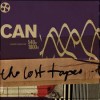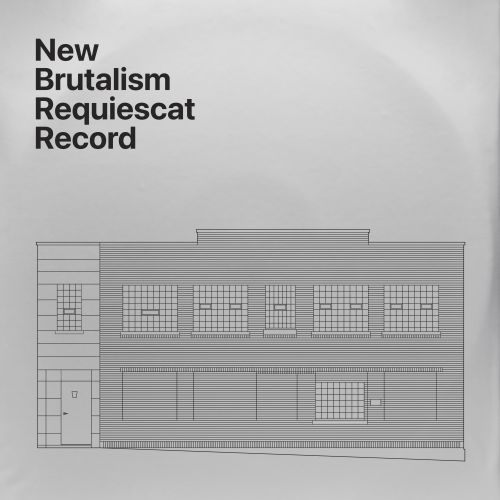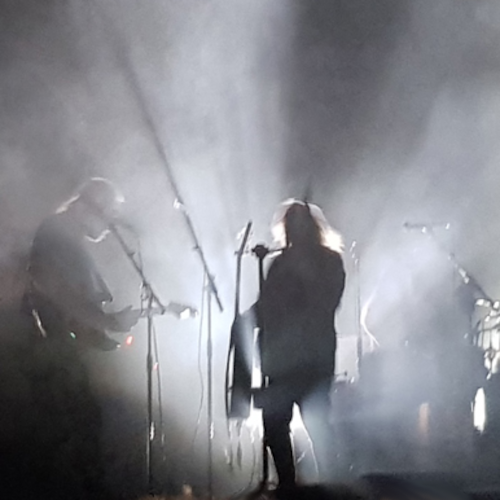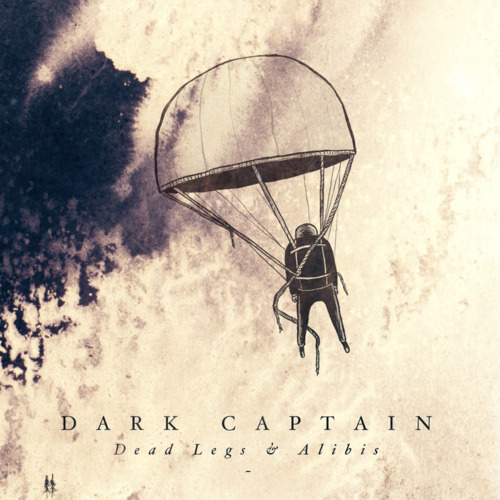 Problem the first: a month or so really isn’t enough time to deal with this. What I really wanted was a properly stodgy, fagend cash-cow studio slurry. Selfish, but it’s much easier to go ‘while there’s highlights on discs 2 and 3, ultimately it’s for the Can fanatic’. The review writes itself. Of course, that’s not the case, and I’m left with an album that’s better than EVERYTHING EVER because, of course, it’s Can and Can are better than EVERYTHING EVER.
Problem the first: a month or so really isn’t enough time to deal with this. What I really wanted was a properly stodgy, fagend cash-cow studio slurry. Selfish, but it’s much easier to go ‘while there’s highlights on discs 2 and 3, ultimately it’s for the Can fanatic’. The review writes itself. Of course, that’s not the case, and I’m left with an album that’s better than EVERYTHING EVER because, of course, it’s Can and Can are better than EVERYTHING EVER.
That’s probably enough of an apology though – I don’t think it’s a problem that this set, and Can in general, throw quite so many ideas out that it’s very difficult to get a comprehensive view of them in one review. I suppose that it’s probably fair to say that this is less a review and more a set of pejorative speculations.
…and on the subject of speculation, one of the strangest thing about this record is quite where to place a lot of it. One of the tracks that was floated prior to release (“Millionspiel”) is clearly good enough to feature on any of the Canonical (eh?) albums. Most of this set is. “Grablau,” at 16 minutes, could’ve been rejected on the basis of being too long for an LP side, or for being too discontinuous in its cuts, not fitting with the rest of the album, possibly even not strong enough – but they always had this Can-do (eh?) attitude and it’s hard to imagine them saying no to something just because it was a bit weird. “Blind Mirror Surf” has perhaps just the slightest inkling that it might have some duff recording moments, but there’s so much playing about with studio ideas that it’s difficult to see how that could’ve been part of their decision. Whatever view you take on this record, it’s impossible to get a Canoply (ok, last one, promise).
I have to say, I’m always a bit sceptical of the ‘ahead of their time’ epithet. Certainly within rock music. By my reckoning, it’s a statement that tends towards the myopia of rockist views rather than a statement of a genuine vanguardism. Beefheart might certainly have done something people hadn’t done in rock, but plenty of people had made rhythms impossible to follow before him. With Can, there’s perhaps less a sense that some of these songs are ‘ahead of their time’ and more like it’d be difficult to place them – elements of “Dead Pigeon Suite” (disc 2) sound like Skinny Puppy fighting Lee Perry remixing “Vitamin C”… they probably wouldn’t fit in the Cantemporary corpus (yeah, I know…). But moreover, the thing I always think with Can is that they were exactly where academic music’s minimalism should’ve been. While Glass and Reich are well-cemented into music theory, I get the impression that Can’s Africanisms, their exploration of studio frippery, their heavy reliance upon repetition, the melodic-not-melodic lines, the use of semi-jazz ideas, always entirely within rock music proper (albeit prog/kosmische), makes better use of contemporary ideas on developing music than most from the academy at the time. In the perverse position of being a rock band, in rock music, against rock music, for rock music. That this set took 30 or whatever years to come out means less that it’s not inferior music to their canon, but that their legend still hasn’t caught up with their artistic excess. Doing for rock music proper what Coltrane et al did for jazz – cementing it as a music worth listening to by people outside of its tradition, with proper, rigorous ideas and alarmingly precise execution.Really though, you would not believe how entirely amazing Disc 2’s live version of “Spoon” is. I’ve had to have a sit down and a cup of very sugary tea every time I’ve listened to it. We should probably indict whoever’s responsible for this not coming to light before. (In fairness, at 16 minutes, it was probably too long for the world of LPs. Still, what’s reason to get in the way of some good old fashioned counter-productive legal action, eh?)
I should probably explain my beef with Mooney here really. Where he’s good, he’s amazing (“Waiting For The Streetcar,” Disc one – the line gets repeated over and over, a counterpoint to some phenomenal Liebezeit action). Where he’s bad, he just seems to interfere (“True Story,” where he intones a not-great poem over some interesting organ lines). Suzuki, by contrast, has a hell of a lot of colour in his voice, and tends towards accentuating the music. Disc 2’s “Abra Cada Braxas,” which threatens an outro at six minutes that only just ends at ten, has Suzuki diligently leaving spaces for everyone else, letting his voice be just an element. Because, for all the repetition that Can use, there’s a lot of discrete development.For my money (and it’s worth mentioning that Can had inevitably matured as musicians by the time of the split with Mooney), Suzuki understands that Can’s repetition wasn’t about punching holes in people’s face with industrial machinery, but was a platform for very discrete development.Liebezeit has the reputation for being told to ‘play more repetitively,’ but his repetition usually involves adding and subtracting beats to the extent where the apparently clear rhythm is suddenly somewhere very different over several repetitions. To use more modern ideas, he’s more Detroit House than he is Industrial. (Again though, someone who’s less enamoured of Leibezeit might say something entirely contrary). On the Leibezeit-epiphany front, his Koto-via-West Africa thing is possibly at its finest on “On the way to Mother Sky” – a moment where I invented hyper-pots of tea and a triple chair so I could have three long sit downs simultaneously.
I know I said about not liking things being ahead of their time, and I probably didn’t explain that terrifically well – the point is less that being ‘ground-breaking’ in and of itself doesn’t say much. It’s entirely possible that I could sit recording any old dross for the next five years, putting it out periodically, and someone could decide it was ‘ahead of its time’ when a load of people do something similar in ten years. The point for me is always that it’s a bit immaterial – plenty of people presaged other things, but that’s less interesting or important than whether they’re good at it. Can were very good at a lot of things, some of which came to be very popular indeed – sampling for instance, which wasn’t particularly ‘new’ for a bunch of smart German guys immersed in Stockhausen. But what’s perhaps most astonishing about Can is the breadth of their explorations – this box is pretty close to being a Bible of what happened in (a certain area of) ‘experimental’ music. Les Rallizes Denudes paying tribute to Can, if you’ll forgive the temporal tautology (“Networks of Foam”), bits of rapid-fire audio-mulching reminiscent of Pop Tatari-era Boredoms on a Throbbing Gristle tribute record (“Blind Mirror Surf”); snuff road movies (“Millionspiel”); Bad Moon Rising-era Sonic Youth playing with Steve Reid (all of the outros from the live takes); AMM guitar perversion (“Evening all day”); the mid-90s post-rock school of melodic bassline (“Oscura Primavera”); Williams Mix-esque ‘pure’ production pieces (“Godzilla Fragment,” although it seems to be live)… and on, and on. There’s even a track where they’re taking a piss (“The Agreement,” where un-named members can be heard pissing).The one conversation I’ve had about this record was with Freq’s editor, who mentioned something about the weird ‘dub’ element – not in the sense of Lee Perry flavours of dub, but more using the studio in a way that lends it a peculiar alien-ness. Going back to that earlier point, that’s kind of why this is only a speculative review – I hadn’t thought about that until he’d said it, and once he did, it was there in spades – “Messers Scissors, Fork and Light” for instance. I’d quite like to give this to a funk-head – “Barnacles” (disc 3) sounds something like what little I know of proper funk (James Brown, Parliament) and what I know of half-funk (Davis’s “On the Corner”) because… well, just because. More the merrier, innit?
Ok, so it’s probably quite clear that this is a pretty essential record – my epiphanical blatherings aren’t going to convince you any more of that. But a big part of my exegesis kind of relies upon there being a transition between Mooney-era and Suzuki-era – and it’s pretty blinding how the (entirely, utterly amazing) production on the live version of “Spoon” seems to show up quite how murky the earlier recordings are – and that’s a pretty big point. Prior to that, it seems like there was an amazing band slightly hampered by shoddy production; after then, and around the Suzuki integration, there’s a sudden realisation that all of the elements shine through perfectly. It’s all good, of course – and if this set was just CD 1, I’d be entirely happy.With the extra two CDs on top, there’s something entirely criminal about quite how or why this has been allowed to languish in the vaults for quite as long as it has.
Right. Stop reading now, go buy.
-Kev Nickells-
[soundcloud url=”http://api.soundcloud.com/tracks/49661290″ params=”auto_play=false&show_artwork=false&color=ff7700″ width=”100%” height=”166″ iframe=”true” /]




3 thoughts on “Can – The Lost Tapes”
Czukay – “his exquisite taste with the tapecuts (see “Grablau,” longest track on CD 1)” DUDE – that was ME!!!!! load of incoherent drivel til I raised the blade. Dig the review…well done
My apologies Jono!
Great review man, havn’t had a chance to listen to the whole thing yet, I feel like I’m saving it for a special occasion…yeh, manyana manyana
It’s got to be hard reviewing something like this, it’s important shit afterall… For the sake of future days